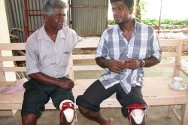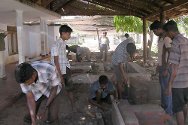Sri Lanka: ICRC to operate exclusively from Colombo
25-03-2011 Interview
In November 2010, the Sri Lankan government asked the ICRC to close its offices in Jaffna and Vavuniya and to conduct its operations exclusively from Colombo. ICRC head of delegation Yves Giovannoni and two Sri Lankan staff members from the Jaffna and Vavuniya offices reflect on ICRC operations in Sri Lanka, past and future.
What has the ICRC been doing in Sri Lanka, particularly in Jaffna and Vavuniya?
The ICRC has been working in Sri Lanka for more than two decades, starting with the uprising of the Janatha Vimukthi Peramuna (People's Liberation Front – JVP) at the end of the eighties and then continuing through the insurgency of the Liberation Tigers of Tamil Eelam (LTTE). Our humanitarian activities have focused on protecting and assisting civilians, prisoners, the wounded and the sick – on all sides. In many cases, we worked with the Sri Lankan Red Cross Society, and restoring links between separated family members is a good example of an area where they played a key role. We have always operated with the approval of the government, and have often been able to act as a neutral intermediary between opposing sides.
What role can the ICRC play in Sri Lanka at the moment? Are there still humanitarian needs in the country?
There certainly are humanitarian needs in Sri Lanka. Some needs arise suddenly and require a rapid emergency response, like the floods at the beginning of the year. Others are more long-term, and require a sustainable solution.
The ICRC continues to address humanitarian needs resulting from the armed conflict, just as we do in many other countries where active hostilities have ended.
People who have lost limbs will of course require artificial limbs for the rest of their lives. The ICRC will continue to support the Jaffna Jaipur Centre for Disability Rehabilitation until 2014. The centre is looking after about 2000 people, mainly in the Jaffna Peninsula.
Many households remain vulnerable. Some because the main breadwinner is dead, missing, or in prison. Others because they have to support a relative disabled by a mine. The SLRCS and the ICRC hope to provide these vulnerable households with micro-credits, vocational training or grants.
The ICRC will continue to assess conditions of detention and detainee welfare at most places of detention throughout the country. We will continue to submit our observations to the authorities in the form of confidential reports. This confidential dialogue between the ICRC and the authorities is in line with our standard procedure. It enables us to maintain the trust of the authorities and to visit people who have been affected by the conflict. Additionally, the ICRC and the SLRCS together provide travel allowances, so that people can visit relatives held in prisons or rehabilitation camps.
During the recent floods, the ICRC supported the efforts of the SLRCS and other Red Cross/Red Crescent Movement partners to help the people and communities affected. It is quite unusual for the ICRC to get involved in dealing with a natural disaster, as the local Red Cross or Red Crescent Society normally takes the lead in this type of situation;, but of course we could not ignore the size of this humanitarian emergency and assisted where we could.
How will the ICRC meet humanitarian needs in Jaffna and Vavuniya without being present in the area?
In November 2010, the government asked us to close our offices in the north and to conduct our operations solely from Colombo. We have been working closely with the SLRCS to set up procedures that will allow us to pursue our humanitarian programmes with a reduced field presence.
We will continue to support families where the main breadwinner is no longer present because of the conflict, where a relative is disabled because of the conflict or where family members remain separated or unaccounted for. The authorities have allowed us to continue our technical and financial support for the Jaffna Jaipur Centre for Disability Rehabilitation until 2014, and we will be conducting our humanitarian visits to people detained in these areas from Colombo.
What is the future of the ICRC in Sri Lanka?
We strongly believe there is still sufficient work to warrant maintaining an ICRC delegation in Sri Lanka for the foreseeable future. At the same time, we are working with the International Federation of Red Cross and Red Crescent Societies and other partners in the Red Cross Red Crescent Movement on the process of restructuring the SLRCS, a process that should result in a stronger Red Cross Society.
Longer term, a lot will depend on how soon the remaining consequences of the armed conflict are resolved. In turn, this depends on the quality of the dialogue on humanitarian matters with Sri Lankan institutions and partners.
We shall continue to work with the Sri Lankan government, academia and other bodies to promote humanitarian norms and their inclusion in the rules and regulations of the armed forces and police. This is especially relevant in view of Sri Lanka’s major role in United Nations peacekeeping operations, where these international norms apply.
* * *
Anton Selvakumar Dilan, Field Officer, Jaffna sub-delegation
What will be your lasting memory of your work with the ICRC?
The day I helped evacuate the sick and injured from the conflict zone in early 2009, at the height of the war. I witnessed the suffering of the people, and their helplessness as they fled for their lives. It was a remarkable experience to be serving with the ICRC at the time – the ICRC was the only humanitarian organization that had access to these people.
How will you want to be remembered by the people you served in the area?
The ICRC has been present in the Jaffna Peninsula for 21 years. It played a significant role in alleviating human suffering, helping thousands of people affected by the armed conflict. I would like the people of Jaffna to remember the ICRC not as a provider of food and emergency supplies but as a ‘life saver.’
* * *
V. Ashokalingam, Driver, Vavuniya sub-delegation
What will be your lasting memory of your work with the ICRC?
I will never forget the smiles of the thousands of people whose lives the ICRC was able to touch in the course of these years – people who received emergency supplies, food or temporary shelters; people evacuated for medical reasons or the people the ICRC visited in detention. And above all the smiles on the faces of children and parents reunited after being separated by the conflict.
How will you want to be remembered by the people you served in the area?
I would like the ICRC to be remembered as an organization that stood by the people of this area during the most difficult phases of the conflict.
Major ICRC operations conducted from Jaffna and Vavuniya:
- From 1990 until 1995, the ICRC helped establish and maintain a safety zone around Jaffna Teaching Hospital in order to ensure that all casualties had access to emergency treatment
- From 1995 until 2002, the ICRC chartered ships that enabled thousands of people to travel to Colombo for medical treatment and transported medical supplies to hospitals in Jaffna
- During the period when the A9 highway was closed to the public, the ICRC helped to maintain public transport in the Jaffna Peninsula, at times even carrying post and school examination papers to Colombo.
- From 2000 to 2002, the ICRC frequently escorted government food convoys. After 1996, the organization acted as a neutral intermediary to facilitate the exchange of corpses between the Sri Lankan military and the LTTE.
- During the ceasefire, between 2002 and 2006, the ICRC acted as a neutral intermediary at the Muhamalai crossing point.
- The 2004 tsunami hit Sri Lanka at the height of the conflict. During this period, the ICRC worked with the SLRCS to build health centres and restore family links.
- With the resumption of hostilities, ICRC-chartered flights transported patients and medical supplies between Colombo and Jaffna.
- During the final phase of the conflict, the ICRC evacuated 13,800 casualties and accompanying relatives from the war zone to Trincomalee by sea.




